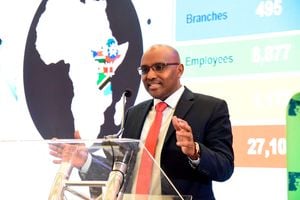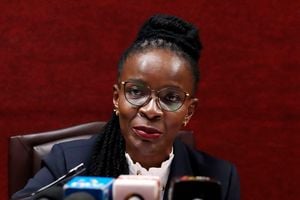
KCB Group shareholders will for the first time in 21 years miss out on dividends after the bank reported an 8.3 percent decline in net profit to Sh37.46 billion in the year ended December 2023.
The bank had posted a net income of Sh40.83 billion the year before. The board of the Nairobi Securities Exchange-listed firm on Wednesday said the decision to not recommend any dividend was necessary so as to preserve capital, especially for KCB Bank Kenya.
The firm also confirmed it had signed an agreement to sell its entire shareholding in National Bank of Kenya (NBK) to Nigeria’s Access Bank at a value that currently stands at Sh13.2 billion.
Access Bank will pay 1.25 times the net assets of NBK on the date of the deal’s conclusion. NBK’s book value stood at Sh10.57 billion as of December 2023.
KCB’s chief executive, Paul Russo, said he expected the transaction to be concluded in six to nine months.
The bank’s finance director, Lawrence Kimathi, said the board had decided to skip the dividend payout to conserve and boost capital levels for KCB Bank Kenya.
“The buffer for KCB Kenya capital was very low and it was a massive concern for not just KCB Group but a lot of investors and analysts. We are happy to report that the buffer has improved. Both at core capital and total capital, we are carrying about 1.3 percentage points in terms of buffer,” said Mr Kimathi.
“However, we still believe that KCB Kenya is not yet where we would want it to be from a capital point of view and it is for this reason that the board has decided that we shall not be having any dividend payout out of the 2023 results. This year, we want to conserve capital. We want to set up KCB Bank Kenya to be able to deliver very good growth in 2024.”
The last time that KCB shareholders were not paid a dividend was in 2002 when Terry Davidson was chief executive. The bank’s dividend payout had risen steadily to a record of Sh3.5 per share or an aggregate of Sh11.09 billion in 2020 and then went on major swings in subsequent years.
The lender in 2022 slashed the payout by a third to Sh2 per share totalling Sh6.4 billion despite the net profit having risen by 19.5 percent.
Last year, operating expenses jumped 60.9 percent to Sh116.79 billion from Sh72.57 billion, leading to a drop in net profit despite operating income having grown 27.2 percent to Sh165.24 billion. Net interest income grew by 23.9 percent to Sh107.3 billion while non-interest income increased by 33.9 percent to Sh57.9 billion.
Mr Russo said the group had to do a “clean-up” that included dealing with legacy issues such as non-performing loans (NPLs) and that required making “tough calls for the future.”
The rise in operating expenses came in the period KCB raised its provisioning for loan defaults 2.5 times to Sh33.64 billion, driven by downgraded loans in Kenya and additional provisions on foreign currency facilities as Kenya shilling shed a quarter of its value against the dollar. The stock of gross NPLs grew to Sh208.3 billion from Sh161.2 billion.
Staff costs rose 26 percent to Sh38.14 billion to reflect the consolidation of DRC Congo’s Trust Merchant Bank (TMB) into KCB operations after the mid-December 2022 acquisition of an 85 percent stake for Sh25.1 billion.
The rise in operating expenses was also driven by a 76.8 percent rise in depreciation charge to Sh7.06 billion and a 61 percent growth in other operating costs to Sh34.6 billion.
“We had a fairly good run in the 12 months in the wake of difficult economic times, with most of the business lines achieving strong organic growth. We have extended a helping hand to our customers through our loan book to support them to navigate and accomplish their ambitions,” Mr Russo said.
“Focus remained on robust cost management to give us room to invest in initiatives to drive growth and put the group on a strong pedestal for better growth in 2024, supported by strong capital and liquidity buffers.”







